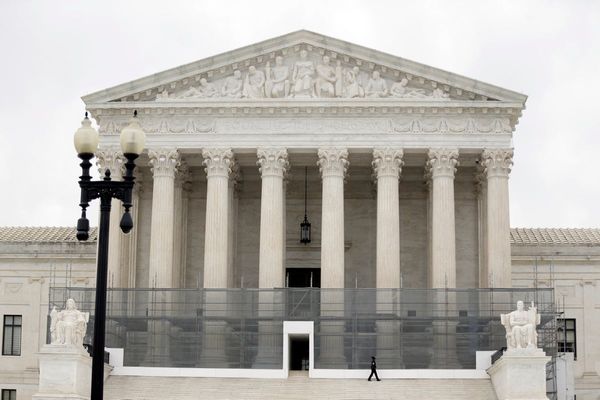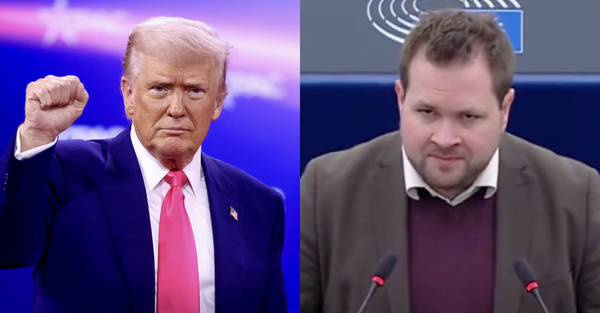
When UFC president Dana White appeared on stage for Donald Trump’s victory address, he credited a string of controversial male influencers – the Nelk Boys, Theo Von, Adin Ross and the “mighty and powerful” Joe Rogan – for the Republican win.
Six months later, Anthony Albanese took Labor to a landslide victory in Australia, claiming the scalps of the Coalition and Greens leaders in the process.
Albanese, too, actively courted content creators. But there were major differences. For one, some were women. And they were largely progressive.
For the first time, millennials and gen Z voters, comprising 47% of the electorate, overtook baby boomers this federal election as the largest voting bloc.
Experts say Labor’s clean sweep goes against trends seen across parts of the west, Asia and Africa in which young male voters are increasingly leaning towards the right. And the content creators could be playing a significant role.
A changing media landscape
Hannah Ferguson, 26, is head of independent news commentary page Cheek Media Co and co-host of the Big Small Talk podcast, both aimed at younger audiences. She says Australia’s election felt like a “battle of influence”.
“Murdoch media were projecting the Coalition to win and endorsing them, and it felt like I was in this bubble where I had to prove myself and push my audience to believe they were the change-makers,” she says.
Ferguson says she has often been asked why “all the influencers in Australia are progressive”. She says that, excluding Fox News, America’s mainstream media is perceived as leftwing, allowing influencers to position themselves against the “establishment”.
While Australian influencers are also responding to “the establishment”, she notes it’s in a media “heavily dominated by Murdoch”.
“The commentators who have risen up in this election are the ones challenging the far-right establishment of media in this country,” she says.
In that sense, she suggests, Trump was the Coalition’s “worst asset”.
“There’s been this belief that men vote based on economic policy, on reason, and women vote emotionally based on social policy, and that divide has been driven and entrenched by the US,” Ferguson says.
“What we saw in Australia … is that positioning is harmful. Across the gender spectrum, Australians said ‘We see through the establishment, we see through the kind of divide the Coalition are pushing, and they’re not giving us any policy.’
“Australia still has issues with hatred and division, but this election showed you can’t run on woke culture wars, because people will reject you.”
Prof Philippa Collin, a social scientist at Western Sydney University, says there’s “no doubt” Australia’s social media landscape played a significant role.
“We know already that it’s an important source of news and information, especially for younger voters,” she says, pointing to the proliferation of election explainers directed at young people among progressive content creators.
But Collin cautions against painting them as entirely leftwing, citing popular anti-government sources such as Rebel News’s Australian bureau chief, Avi Yemini, and comedian Isaac Butterfield, who campaigned against independents and the Greens.
“The really interesting thing about their content, and where it’s possibly different to some of the content that we see coming out of the US, is it seems to kind of be much more moderate in its presentation.”
Content that seems “less angry and less direct … possibly resonates more with an Australian audience”, she says.
She believes young people, whether their politics skews further left or right, feel current media offerings directed at them “ are lacking”.
Bucking global trends?
An analysis by youth and democracy researcher Intifar Chowdhury, of the Australian Election Study (1996-2022) found while gen Z men were politically more conservative than gen Z women, they were still more progressive than older generations of men.
Chowdhury says the 2025 election results stop “any kind of insinuation” that young men in Australia are becoming more rightwing.
“If you look at electorates with a higher share of both first-time voters and voters under the age of 30, the higher the percentage, the more likely they are to swing towards Labor,” she says.
“I will be very surprised if we see a swing among young men towards the Coalition, because no matter what demographic you’re talking about, there is some swing against the Coalition.”
If her hypothesis is correct, it’s bucking global trends.
At the 2024 US election, men aged between 18 and 29 turned out in force for Trump, while women of the same age voted for Kamala Harris by an even wider margin.
Similarly, men at the 2024 UK election were twice as likely to vote for Nigel Farage’s rightwing Reform UK, while young women were more likely to vote Green.
In Germany, there are signs young men under 30 are moving towards the far-right Alternative for Germany (AfD). China, Tunisia and South Korea have also experienced a surge in support for rightwing candidates among young men.
But data suggests young Australians have been repelled by Trump’s leadership style. A March study of voters aged 18-44 found just 23% surveyed said Australia would benefit from a leader like Trump; 58% said “absolutely not”.
A sense of dread about social cohesion and the rise of the far right were consistently cited as major issues among a cohort of almost 1,000 young voters who reached out to Guardian Australia over the election campaign.
Chowdury describes what occurred this election as the “Trump slump”. “I think Australia just became more moderate, to be honest,” she says.
Generational differences
That’s not to say there are no gender differences. Chowdhury’s analysis found young Australian women shifting towards the left at a faster rate than men, with 34.0% of gen Z men voting for the Coalition in 2022 compared with 19.8% of women.
But the bigger indicator of voting preferences, polls tracked by Guardian Australia over the past year suggest, is the generational gap.
All but one of the nation’s five youngest electorates were won by Labor in 2025 after previously being held by the Greens. (Ryan was too close to call at the time of writing.)
“Australians in general tend to vote heavily based on their issues of importance,” Chowdhury says.
“If you think about the generational grievance of the younger generations, it’s being locked out of the [housing] market, the erosion of the safety net, job precarity.”
Konrad Benjamin, the creator behind Punters Politics, courts an audience of predominantly millennial males with similar concerns – largely economic: a “rigged” housing and taxing system and abuse of power by large corporations.
Age aside, Benjamin says his audience is “very diverse”. “I had a bloke from Family First in Newcastle say ‘your stuff is amazing’, and then the Greens ask to get a picture with me,” he says.
“I’m pointing out the problem, and I’m just making sure people have the right scapegoat … that our guns are pointed upward to the establishment and not at each other, or to immigrants or vulnerable people.”
He doesn’t know how far Australia can read into its election results. “Maybe people lurch to the right because Trump was charismatic – you get Dutton with charisma, maybe the blokes would lurch to the right,” he says.
But he thinks part of the concern around the Andrew Tate-ification of young men is “media moral panic” that isn’t addressing the root cause – isolation and pessimism.
“Tate is the solution to a problem,” he says. “Young men have less economic opportunity [than previous generations], the jobs they relied on are disappearing, the relationship structure is breaking down.
“I think where the right wing stepped into that void was: where are the masculine role models?”
The compulsory-voting effect
Jill Sheppard, a lecturer in the Australian National University’s school of politics and international relations, says the “manosphere”, to the extent it exists in Australia, isn’t having the same electoral impacts as in the US.
“That’s not because there aren’t cohorts of young men being radicalised online. I think it’s purely because of compulsory voting,” she says.
“For every young Andrew Tate watcher who enters the electorate, there are 10 very regular voters – Greens-voting, for the most part.
“There is, absolutely without doubt, a very small number of very angry young men who are voting in Australian elections – but they’re dwarfed by the young voters who either vote like their parents do, or they’re voting Greens because they’re worried about climate change and renters’ rights and Hecs.”
Compulsory voting also means mobilising any authoritarian bent among male voters is not politically effective, Sheppard says, as it risks ostracising large parts of the nation.
“Do I think young conservative men are an issue right now? No,” she says.
“Do I think the parties will do anything to stop them becoming an issue? No, and they’re not incentivised to – that’s the flipside of compulsory voting.”







